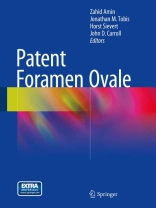This book is the ultimate reference on patent foramen ovale (PFO), a defect in the septum of the heart estimated to be present in more than twenty percent of the adult population and a proven cause of systemic embolism. All chapters have been written by internationally recognized experts in the field and cover PFO genetics and anatomy in addition to the effect PFO can have on various different organs and its supposed involvement in several conditions and clinical syndromes such as migraine, diving incidence, platynea orthodeoxia, economy class syndrome, sleep apnea and persistent desaturations in mild right ventricular dysfunction.
As PFO anatomy varies significantly between individuals, chapters have also been included on the diagnostic tools, methods and techniques for appropriate assessment, detection and characterization of PFO. Furthermore, the multitude of available closure devices and techniques for PFO closure are discussed together with current and ongoing trial data. The book concludes with guidance and instruction on establishing a successful PFO program.
Patent Foramen Ovale will be an essential text for the whole adult and pediatric interventional community, general cardiologists, internists, primary care physicians, neurologists and device companies in addition to medical students, graduate students and fellows in training.
Tabla de materias
SECTION I: BACKGROUND AND ANATOMY.- Historical perspective and importance of PFO.- Embryology, Neonatal Circulation and Anatomy of PFO.- Anatomical variations of Patent Foramen Ovale.- Aging and Patent Foramen Ovale.- SECTION II: METHODS AND TECHNIQUES FOR DETECTION AND CHARACTERIZATION OF PFO.- Echocardiographic detection and transcranial Doppler quantification of right-to-left shunting.- ICE: intra-procedural evaluation and guidance during closure of PFO.- A Comparison of Methods to Detect and Quantitative PFO: TCD, TTE, ICE and TEE.- Angiographic evaluation for PFO and Pulmonary AVMs.- SECTION III: PFO AND CLINICAL SYNDROMES.- An Overview of Clinical Syndromes (Keeping The Heart In Mind).- The Association of Patent Foramen Ovale and Migraine Headache.- Current Patient Management Issues, Clinical Trial Design Challenges and the Pathway Forward.- Patent foramen ovale and divers.- Orthodeoxia and Platypnea.- Obstructive Sleep Apnea and Patent Foramen Ovale.- PFO and Various Types of Surgery.- When a PFO is Discovered Incidentally.- SECTION IV: CLOSURE METHODS.- The GORE Septal Occluder.- The novel PFO specific closure devices: Why did they fail?.- Optimal device for children and closure indications in pediatric population.- Occlutech, PFM, Lifetech and other new devices. What’s on the horizon?.- Complications of PFO Closure.- SECTION V: STATISTICAL METHODS, TRIALS AND TRIBULATIONS.- Device Closure of Patent Foramen Ovale or Medical Therapy for Cryptogenic Stroke: The CLOSURE I Trial.- The Gore REDUCE Clinical Study.- The PC Trial: An Effective Treatment Not Demonstrating Effective Power.- From FDAs point of view: What is needed to move PFO closure for stroke prevention forward?.- The Medical Device Manufacturer’s Perspective – W.L. Gore & Associates, Inc.- PFO-Patient’s Perspective.- Clinical Trials to Assess the Relationship between Patent Foramen Ovale and Migraine Headaches.- Do We Need More PFO Trials: Hypercoaguable Syndromes, Obstructive Sleep Apnea, and Arrhythmias.- SECTION VI: DIFFICULTIES/OBSTACLES IN STARTING PFO CLOSURE PRACTICE.- Obstacles in Starting a PFO Closure Program. How I Did It.- Developing a successful integrated PFO closure program.












